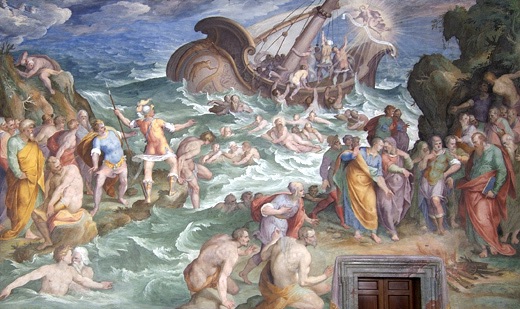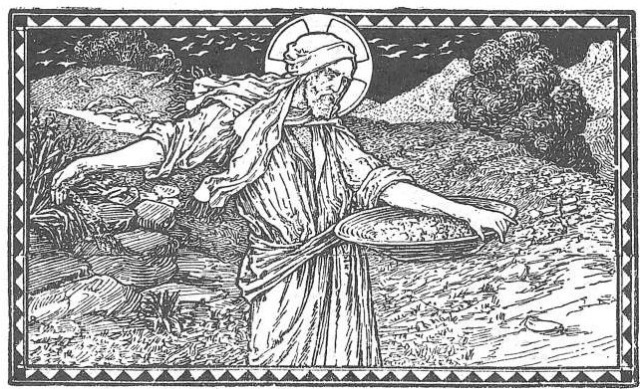Sexagesima Sunday (yesterday) contained a beautiful Epistle from St Paul to the Corinthians, describing his sufferings willingly borne for Christ and his trust in the Lord. For all those who were not fortunate enough to be able to attend Mass in the Extraordinary Form and therefore will not have heard it, and for all those who did but might have overlooked its profound message of comfort for the suffering Church in our day, it is well worth meditating on a bit further. (H/T to Rorate Caeli. See also Father Z’s reflections: “that we may be fortified against every adverse thing”.)
“You gladly put up with fools, because you are wise yourselves! For you suffer it if a man enslaves you, if a man devours you, if a man takes from you, if a man is arrogant, if a man slaps your face! I speak to my own shame, as though we had been weak. But wherein any man is bold – I am speaking foolishly – I also am bold. Are they Hebrews? So am I! Are they Israelites? So am I! Are they offspring of Abraham? So am I! Are they ministers of Christ? I – to speak as a fool – am more: in many more labours, in prisons more frequently, in lashes above measure, often exposed to death. From the Jews five times I received forty lashes less one. Thrice I was scourged, once I was stoned, thrice I suffered shipwreck, a night and a day I was adrift on the sea; in journeyings often, in perils from floods, in perils from robbers, in perils from my own nation, in perils from the Gentiles, in perils in the city, in perils in the wilderness, in perils in the sea, in perils from false brethren; in labour and hardships, in many sleepless nights, in hunger and thirst, in fastings often, in cold and nakedness. Besides those outer things, there is my daily pressing anxiety, the care of all the churches! Who is weak, and I am not weak? Who is made to stumble, and I am not inflamed? If I must boast, I will boast of the things that concern my weakness. The God and Father of the Lord Jesus, Who is blessed forevermore, knows that I do not lie. In Damascus the governor under King Aretas was guarding the city of the Damascenes in order to arrest me, but I was lowered in a basket through a window in the wall, and escaped his hands. If I must boast – it is not indeed expedient to do so – but I will come to visions and revelations of the Lord. I know a man in Christ who fourteen years ago – whether in the body I do not know, or out of the body I do not know, God knows – such a one was caught up to the third heaven. And I know such a man – whether in the body or out of the body I do not know, God knows that he was caught up into paradise and heard secret words that man may not repeat. Of such a man I will boast; but of myself I will glory in nothing save in my infirmities. For if I do wish to boast, I shall not be foolish; for I shall be speaking the truth. But I forbear, lest any man should reckon me beyond what he sees in me or hears from me. And lest the greatness of the revelations should puff me up, there was given me a thorn for the flesh, a messenger of Satan, to buffet me. Concerning this I thrice besought the Lord that it might leave me. And He has said to me, My grace is sufficient for you, for strength is made perfect in weakness. Gladly therefore I will glory in my infirmities, that the strength of Christ may dwell in me.” (2 Cor. 11:19-33; 12:1-9)
*****
From the Introduction to Sexagesima Sunday in Saint Andrew Daily Missal:
(Station at St Paul-without-the-Walls)
As on last Sunday and on those which follow until Passion Sunday the Church teaches us “to celebrate the Paschal Sacrament” by “the scriptures of both Testaments ” (Prayer of Holy Saturday after 7th Prophecy).
Through the whole of this week the divine office is full of the thought of Noah. God seeing that man’s wickedness was great upon the earth said, “I will destroy man whom I have created”; and He told Noah, “I will establish my convenant with thee and thou shalt enter into the ark.”
For forty days and forty nights rain fell on the earth, while the ark floated on the waters which rose above the mountain tops and covered them; and in this whirlpool all men were carried away “like stubble” (Gradual); only Noah and his companions in the ark remaining alive. Then God remembered them and at length the rain ceased. After some time, Noah opened the window of the ark and set free a dove, which returned with a fresh olive leaf and Noah understood that the waters no longer covered the earth. And God told him, “Go out of the ark, thou and thy wife, thy sons and the wives of thy sons with thee” (Communion). And the rainbow appeared as a sign of reconciliation between God and men.
That his story is related to the Paschal mystery is shown by the fact that the Church reads it on Holy Saturday; and this is how she herself applies it, in the Liturgy, to our Lord and His Church. “The just wrath of the Creator drowned the guilty world in the vengeful waters of the flood, only Noah being saved in the ark. But then the admirable power of love laved the world in blood “. It was the wood of the ark which saved the human race and it is that of the Cross which in its turn, saves the world. “Thou alone,” says the Church, speaking of the Cross, “hast been found worthy to be, for this shipwrecked world, the ark which brings safely into port.” The open door in the side of the ark by which those enter who are to escape from the Flood, and who represent the Church, are as is explained in the liturgy, a type of the mystery of redemption; for on the Cross, our Lord had His sacred side open and from this gate of life, went forth the sacraments, giving true life to souls. Indeed the blood and water which flow from thence are symbols of the Eucharist and of Holy Baptism.”
“O God, who by water didst wash away the crimes of the guilty world, and by the overflowing of the deluge didst give a figure of regeneration, that one and the same element might in a mystery be the end of vice and the origin of virtue: look, O Lord, on the face of Thy Church and multiply in her Thy regenerations, opening the fonts of baptism all over the world for the renovation of the Gentiles. “In the days of Noah,” says St. Peter, “eight souls were saved by water, whereunto Baptism being of the like form, now saveth you also .”
On Maundy Thursday, when the Bishop blesses the holy oil from the olive-tree which is to be used for the sacraments, he says: “When of old the crimes of the world were atoned for by the waters of the Flood, a dove foreshadowing the gift to come, announced by an olive-branch the return of peace to the earth. And this indeed is made clear by its effects in latter times: when the waters of baptism having washed away all guilt of sin, the unction of the oil makes us joyous and serene.” The Blood of Christ is the blood of the New Covenant, which almighty God has made with man, through His Son. “Thou,” cries the Church, “who by an olive-branch didst command the dove to proclaim peace to the world.” Peace is often mentioned in the Mass which is the memorial of the Passion, “Pax Domini sit semper vobiscum.” And we shall find the collect for Easter Friday, speaking of the Paschal Sacrament, as the seal of reconciliation between God and men.
Above all, however, in his divinely appointed mission as father of all succeeding generations Noah is a figure of Christ; he was truly the second father of the human race and he remains the type of life continually renewed. We are told in the liturgy that the olive-branch by means of its foliage is a symbol of the prosperous fertility bestowed by almighty God upon Noah when he came forth from the ark, and the ark itself is called by St. Ambrose in to-day’s office, the “seminarium,” or nursery, that is, the place containing the seed of life which is to fill the world.
Now, Christ, much more than Noah, was the second Adam, peopling the world with a race of believing souls, faithful to God. On Holy Saturday, in the prayer following the second prophecy which is concerned with Noah, the Church humbly asks almighty God to “peacefully effect,” by His eternal decree, “the work of human salvation,” and to “let the whole world experience and see that what was fallen is raised up, what was old is made new,” and that “all things are re-established, through Him from whom they received their first being, our Lord Jesus Christ.” It was through the Word that God made the world in the beginning (last Gospel), and it is by the preaching of His Gospel that our Lord came to bring men to a new birth. “Being born again,” says St. Peter, “not of corruptible seed, but incorruptible, by the word of God who liveth and reigneth for ever … And this is the word which by the gospel hath been preached unto you.”
From this we can see why to-day’s Gospel is taken from the parable of the Sower, for “the seed is the word of God”. If in Noah’s days men perished, St. Paul tells us, it was because of their unbelief, while at the same time it was by faith that Noah “framed the ark … by the which he condemned the world, and was instituted heir of the justice which is by faith.”
In the same way, those who believe in our Lord’s words will be saved.
According to St. Augustine’s exposition, “as there were three floors in the ark, so there are three different spiritual harvests”. In to-day’s Epistle, St. Paul recounts all that he did and suffered in the course of preaching the faith to the Gentiles and indeed he, the Apostle to the Gentiles, was the outstanding preacher of the world. He is the “minister of Christ,” that is, the one whom God had chosen to unfold to all nations the good news of the Incarnate Word. “Who will grant me,” cries St. John Chrysostom, “to walk around St. Paul’s body, to embrace his tomb, to behold the dust of that body which filled up what was lacking in Christ’s sufferings, which bore the marks of his wounds, which everywhere spread abroad, like good seed, the preaching of the Gospel?” The Roman Church has fulfilled this desire, in the case of her own children, by making a station on this day to the basilica of St. Paul-without-the-walls. “Through the Church’s neophytes,” we read in the liturgy, “the earth is renewed, and thus renewed, she brings forth fruit as it were from the dead.“








“You gladly put up with fools, because you are wise yourselves!”
We all enjoy a bit of grovelling flattery, don’t we?
(Everyone except Toad, of course.)
LikeLike